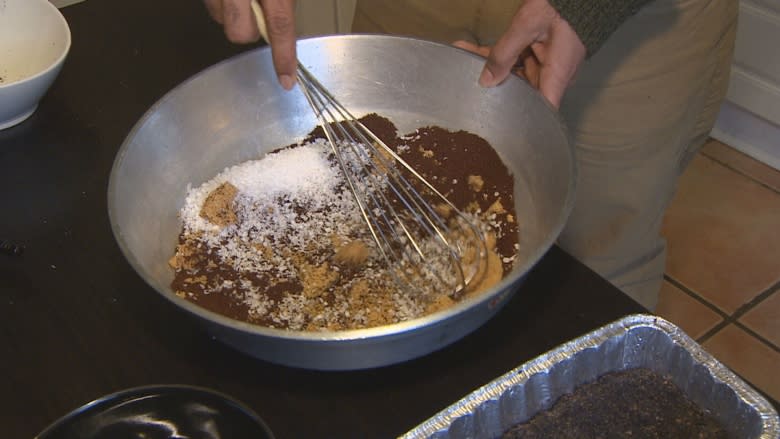How coffee grounds turned firewood could be a lifeline for refugees
The remnants of your morning cup of coffee could be a lifeline for refugees living in camps in sub-Saharan Africa.
A group of University of Toronto students has created Moto, an alternative to firewood made from recycled coffee grounds.
Its premise is simple. Take dried-out coffee grounds, paraffin wax and sugar; mix, mould in a loaf pan and bake to create a firewood substitute.
'Super low-tech'
Keeping it "super low-tech" and making use of waste coffee grounds was key, said Sam Bennett, an MBA student at the Rotman School of Management.
The logs have the potential to eliminate the need for women and children living in refugee camps to leave and scavenge for firewood, he said.
Won't need to gather firewood
"As soon as they're out of the camp, they're unsafe and that leaves them open to assault," Bennett told CBC Toronto.
"[Moto] prevents the dangers associated with that, but also frees women up to spend time doing other things, whether that's trying to find another source of revenue or spending time educating their kids."
According to a 2014 survey by the United Nations High Commissioner for Refugees, 90 per cent of refugees in Chad, Ethiopia, Kenya and Uganda rely on firewood to cook.
Bennett said they were able to boil water as well as cook lentils and polenta using the prototype of Moto, which can burn for nearly 90 minutes. But the inventors are striving for the firewood to last even longer.
Gowtham Ramachandran said they wanted to ensure Moto could re-purpose what would otherwise be waste, and there was no shortage of used coffee grounds being generated in Toronto.
For now, they collect coffee grounds at nearby Starbucks, Second Cup and Tim Hortons outlets, but as the project ramps up, they'll need a partnership, the U of T MBA student said.
Hult Prize competition
Moto is competing for the Hult Prize, a worldwide competition that will award the winning venture with $1 million US to start the social enterprise.
The team will compete in the regional round in Shanghai in March. If they advance, they will attend a six-week entrepreneurial seminar before presenting again in September, when the winner will be announced.
"It's become something more than just a competition," said Ramachandran. "We want to make this thing work."
The next step for the team is to connect with NGOs in Africa, as well as refugees now living in Toronto, to get a sense of what tweaks are needed to Moto, Bennett said.
They kept its design simple so that eventually people in Africa can produce the log locally, he said.
"We're thinking of creating basically micro-entrepreneurs, who would produce the logs and then distribute them throughout the camp."
"When you free up a quarter of someone's day, the potentials are pretty boundless."




